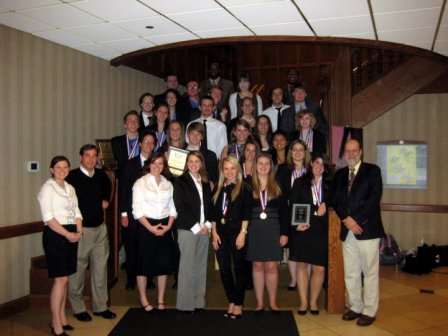I was sent an e-mail this week that for some reason caught my attention.
It read as follows:
Hello,
I thought you might like to know that America.gov has published a feature on public efforts to promote high-tech entrepreneurship. The feature includes a blog discussion of relevant issues.
Regards,
Andrzej S Zwaniecki
Editor, International Information Programs
U.S. Department of State
How interesting. The U.S. Department of State has its tentacles in entrepreneurship.
So I went to the link at America.gov. I must admit, it was my first time at this site.
The page linked to at America.gov had a quiz.
“Can Your Government Promote Entrepreneurship?” was the headline in bright red at the top of the page.
Of course, I immediately looked for the “NO” button to click. After all, if venture capitalists who study high growth ventures for a living have such a lousy record of picking winners — the good ones get about one out of ten right — how in the world can government officials expect to be able know where the market will lead us next?
But there was no button that would let me answer “NO”. The site just wouldn’t let me answer that first question. Instead had a second question that I could answer that was part of a quiz: “You can invest $1 million of public funds to spur high-tech business. What steps will you take? (Click START.)”
So I went ahead and threw caution to the wind and clicked “START”.
Up popped the following:
Imagine you are a provincial government official ready to invest $1 million of public funds to kick-start high-tech business. After considering the following hypothetical scenario, test your decisions.
BACKGROUND:
Your province was strong in traditional manufacturing, but recently lost ground to cheap overseas competition, and your government is promising an economic recovery.
Three local universities are doing fruitful research on clean-energy technologies.
As often happens, you hire a consulting firm. Assume that the firm studies the business climate in your province and reports that the $1 million you have to invest to kick-start entrepreneurship should be split among efforts to encourage three types of ventures: 1) clean-energy technology, 2) biotechnology and 3) high technology.
You must encourage local economic growth. You could place strings on the money, matching it only to loans by local investors supporting companies that hire locally, or you could work with more-experienced firms based overseas that want to operate in your province.
The consulting firm recommends converting a former manufacturing facility into a research park/business incubator. Some of the potential tenants, however, prefer to maintain headquarters in their own garages or basements. They want networking opportunities but can’t afford office space, even if rent is subsidized.
The consultancy would be happy to manage the entire program, as it provides business-development services. But you can also rely on the local research universities and venture capital firms for advice, and they have a strong interest in the success of local businesses.
As you go on to set up an appropriate entrepreneurship program, you need to answer four questions:
1. Do you split the money into three funds?
2. Do you aim at the developing local businesses or global players?
3. Do you establish a physical or virtual research park?
4. Do you hire the consulting firm to manage the program?
(Click on Questions 1, 2, 3 and 4 and on the options to answer them.)
Source: This scenario is based on opinions of experts who have tackled the topic of what government efforts are likely to succeed in spurring high-tech entrepreneurship. They are authors Josh Lerner (Boulevard of Broken Dreams) and Anthony Townsend (Future Knowledge Ecosystems).
“Wait just a minute,” I exclaimed out loud while sitting on my back porch. “Who the heck are these experts and what do they know about entrepreneurship.”
It seems that Josh Lerner is a Harvard professor of Investment Banking. Wait just a minute! Investment banking? Aren’t those the guys who helped get us into the current mess with all of their knowledge of managing markets?
Anthony Townsend is Director of Technology Development at the Institute for the Future out in Palo Alto, California. His blog is full of ideas on how government can reinvent cities, shape markets, and the like.
Hmm… Sure wish the quiz had given me more options, like maybe “None of the Above.”
All of this reminded me of the following quote from Friedrich August von Hayek about the proper role of government in the economy:
“He will therefore have to use what knowledge he can achieve, not to shape the results as the craftsman shapes his handiwork, but rather to cultivate a growth by providing the appropriate environment, in the manner in which the gardener does this for his plants.”
I have to agree with Hayek on this one. The last thing we need right now is the State Department, an investment banking professor and a futurist trying to craft our economy.
Let’s cultivate the economic soil and see what the market spouts!

